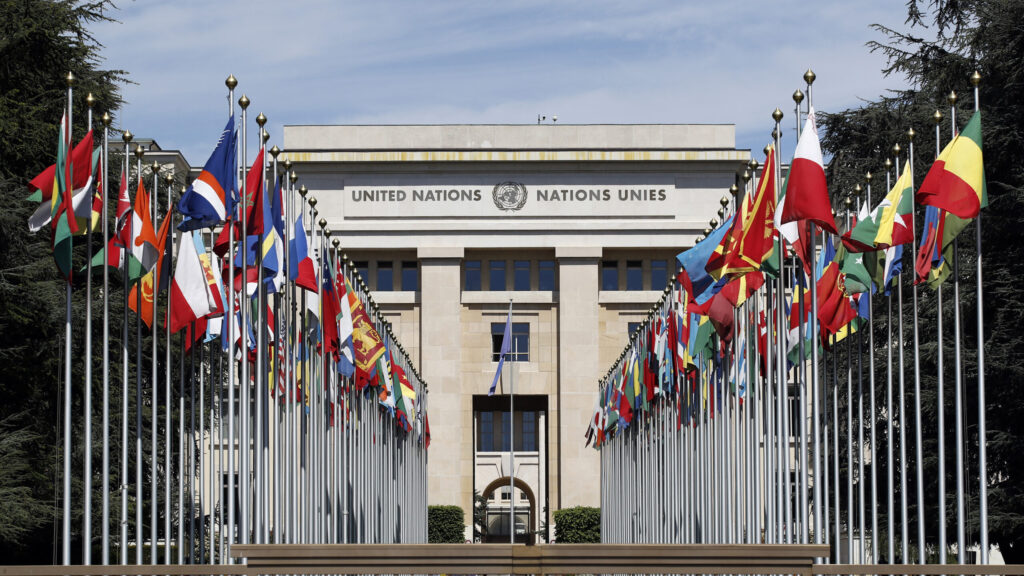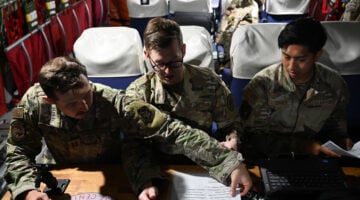
WASHINGTON — In the run up to the final meeting of the UN working group on military space norms of behavior, the 27 nations of the European Union have committed to a Biden administration proposal not to conduct tests of destructive, direct-ascent anti-satellite (ASAT) missiles.
Further, the EU countries — most of which are also NATO allies — are recommending that the UN Open Ended Working Group (OEWG) on Reducing Space Threats consider norms to limit all activities that create space debris, including on-orbit rendezvous operations that physically impact another state’s satellites.
“Concerned that the use of destructive ASAT systems might have widespread and irreversible impacts on the outer space environment, the Member States of the EU consider such commitment as an urgent and initial measure aimed at preventing damage to the outer space environment, while also contributing to the development of further measures for the prevention of an arms race in outer space,” the EU wrote in a joint statement to the OEWG, made public this week [PDF].
The OEWG meets Aug. 28-Sept. 1 in Geneva in hopes of hashing out an accord to constrain dangerous on-orbit activities by national militaries and reduce risks of conflict in space.
Victoria Samson of the Secure World Foundation said the EU’s announcement “build upon the momentum” of previous actions. Previously, 13 countries, including five that are in the EU, have made this commitment at the national level — meaning the EU’s announcement brings the total to 35. In addition, at the December UN General Assembly meeting in New York 155 nations signed onto a non-binding resolution voicing general support for a UN-wide prohibition on destructive ASAT testing.
“It is my hope that this increasing amount of support for designating this type of behavior as dangerous and irresponsible will be reflected in the discussions and possible report of the last meeting of the [OEWG] later this month,” Samson added.
Jessica West, of Canada’s Project Ploughshares, said that the key importance of the EU commitment is the fact that the group is not simply a national actor. “This collective statement signals a shift in the moratorium from a series of unilateral declarations to a growing multilateral initiative,” she said.
Both Secure World Foundation and Project Ploughshares are non-governmental organizations that have been contributing to the OEWG process since it began last May.
The EU statement itself recommended that bars on destructive ASAT testing be included in a final OEWG “consensus” report as one “area of convergence where additional multilateral efforts and collaborations are needed” to build solid international norms.
The EU recommended that five other issues be agreed for further UN development:
- Norms addressing intentional and destructive acts that result in the creation of space debris, in particular long-lived debris.
- Norms addressing in-orbit rendez-vous (physical contact) operations that affect another state’s space systems.
- Norms addressing proximity orbital operations that affect other state’s space systems.
- Norms addressing activities that impair the provision of space-based/enabled services critical to the public.
- Further discussions to shape a common understanding the concepts of “due regard,” “harmful interference” (Article IX of the Outer Space Treaty), and of their practical implementation by states.
Finally, the EU statement called on UN member states to increase transparency about their national space activities and share information, including via the online Space Security Portal being established by the United Nations Institute for Disarmament Research.
The chances of the OEWG coming up with a report that all participants can reach consensus on, however, is unlikely. Both Russia and China have rejected the limited ASAT testing ban, and since the beginning of the talks have been seeking to gum up the group’s work.
For example, in a white paper submitted to the OEWG last month [PDF], Moscow called for an agreement by all states to launch formal treaty negotiations on the Prevention of an Arms Race in Outer Space, that would include a ban on the placement of any kind of weapons for any purpose in outer space — something the US consistently has rejected.
“Russia and China were always going to object to the OEWG process so I’m not sure that there is much that could be done to completely eradicate their complaints,” Samson noted.
That said, West argued that even if no consensus is reached, the OEWG discussions already “had a positive impact.”
“Commitments not to engage in destructive ASAT testing are one of the most concrete initiatives to emerge from the ongoing [OEWG], and … one of the most tangible military [space] restrictions adopted to date. It also points to the value of linking behaviours to hardware as a practical approach to peace and arms control in space,” she said.
“The working group has fundamentally changed the nature of the discussion on space security. New ideas are coming to the fore, and individual states are championing them far beyond the confines of the meeting room,” West concluded.

